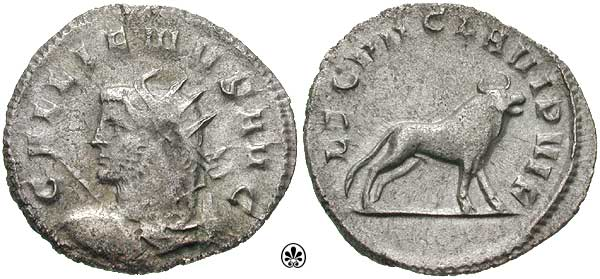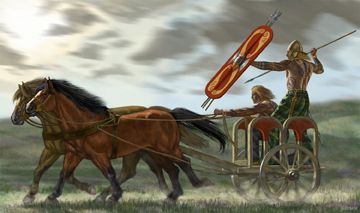4.4 Book IV: 55 B.C Chapters 32-35 + first line of Chapter 36
9 min read•june 18, 2024
Jack Marso
Riya Patel
AP Latin 🏛
24 resourcesSee Units
Chapters 32-35 + first line of Chapter 36
As night fell in the winter night, Roman warships were ruined by the ocean’s tides and no food was brought to the hungry Roman legions. The Britons understood the severity of their situation and planned on revamping the war effort upon the weakened. Romans or starving them out throughout the brutal winter. Although no war was waged, Caesar understood what could happen to them, and feverishly attempted to strengthen the Roman legions once more. Will the Roman legions be strong enough to fend off the healthy Britons? Let’s take a look!
Check out Gallic War War, Book 4 Chapters 32-36!
Chapter 35
Caesar, etsi idem quod superioribus diebus acciderat fore videbat, ut, si essent hostes pulsi, celeritate periculum effugerent, tamen nactus equites circiter XXX, quos Commius Atrebas, de quo ante dictum est, secum transportaverat, legiones in acie pro castris constituit. Commisso proelio diutius nostrorum militum impetum hostes ferre non potuerunt ac terga verterunt.
Quos tanto spatio secuti quantum cursu et viribus efficere potuerunt, complures ex iis occīderunt, deinde omnibus longe lateque aedificiis incensis se in castra receperunt.
- Why would the Britons once again attempt to attack the Romans after fleeing the fighting when Julius Caesar arrived with reinforcements?
- What strength does the enemy have in the land-engagements, other than health and resources, that the Romans couldn’t disembark, prior to their next engagement with the enemy?
- Based on information from our last question, how does Caesar react to this recurring plot of being harmed by speed?
- What political and military ideals are shown in lines 9-10?
- What ONE political or military practice is shown in lines 10-12?
Answers (Don't peek!👀)
- The Britons understand how scanty the number of healthy Roman soldiers and supplies they are accessible to. The soldiers are starving in the midst of winter, and with only some ships able to be saved from the high tides, the Britons believe they once again have the heavy advantage, even after the days of consistent storms, strengthening their point. The Britons want to become a feared force in the Meditteranean and not allow the Romans to return to their normal stance of superiority once more.
- Their supply of cavalry. The Britons’ supply of fast-paced chariots, cavalry, and the Romans' lack of health didn’t allow Caesar’s men to continue after the retreating enemy during the initial process of disembarking. After the Britons revamped the war-effort and attempt for liberation from other forces surrounding the Mediterranean, they once again fled the fighting as Julius Caesar and his cohorts came to aid the devastating ambush of his legion collecting corn. The events surrounding Caesar’s first invasion of Britain would be drastically different if his cavalry was able to disembark and not be harmed by the dangerous tides of the sea because the enemy couldn’t clearly compete in hand-to-hand combat alongside the Roman soldiers, even if they weren’t fully healthy.
- Commius the Atrebatian, his ally that has relations within the region, had brought over thirty horsemen which allowed Caesar to begin tactically forming his plan for a military offensive attack.
- To begin, the Roman soldiers' presence is daunting and surprising to the Britons, who believed this would be another chance at an ambush, but Caesar once again suspected their actions. The Roman soldiers are trained to be diligent and strong, even though they have experienced laborious hardships throughout this expedition, they still remain loyal to their general and Rome. It shows how important military dominance is to Roman culture and politics, and how respected Roman soldiers were within Roman society. They put their lives and reputation on the line for their country and for their respective legion and will do everything in their power, every ounce of speed and strength will be emitted in order to gain a victory.
- Scorched earth: This is a military strategy that focuses on destroying everything in sight, often with fire, that would offer any favorable utilization to the enemy, which in our case, was done by the destruction of enemy buildings and property. It is most commonly recognized in the affair of the American Civil War by Sherman’s March to Sea that wreaked havoc amongst the Confederate industry, infrastructure, economy, and even civilian property
Chapter 34 Lines 1-9
[Quibus rebus] perturbatis nostris [novitate] pugnae [tempore oportunissimo] Caesar auxilium tulit: namque [eius adventu] hostes constiterunt, nostri se [ex timore] receperunt. Quo facto, [ad lacessendum] hostem et [ad committendum] proelium alienum esse tempus arbitratus [suo] se [loco] continuit et brevi tempore intermisso [in castra] legiones reduxit.
Dum haec geruntur, nostris omnibus occupatis, qui erant [in agris] reliqui discesserunt
Translate these lines as literally as possible
Translation (don’t peek👀!) Remember if you have different words than I did, that’s perfectly acceptable! Just make sure they have the same meaning attached to them.
When our troops were projected into uncertainty under these circumstances by the novel method of the fighting, Caesar brought assistance not a moment too soon; for his arrival caused the enemy to pause, and warranted our men to rebound from their fear. This done, he considered the time unfavorable for provoking and engaging the enemy in war; he, therefore, himself stood in his own quarter and, after briefly intervening, ushered the legions back into camp. Throughout these events, our troops were all actively occupied, and the Britons who were in the fields fled.
Breakdown of Chapters 32-35 + first line of Chapter 36
- Caesar’s attention shifts to mentioning the one legion called the Seventh. This legion had been previously assigned to collect corn whereas no known suspicion of hostility yet arose. These people initially remained in the fields where the chiefs previously rounded them up or traveled throughout the camp often.
- Then, the outposts who were on duty at the gates of the Roman camp reported to Caesar that they had spotted “a greater dust than usually seen in that quarter in which the legion had marched.” The plan of the Britons was slowly unrolling is what Caesar immediately began to believe and began signaling out orders to his men.
- Caesar ordered the “two cohorts which were on an outpost to proceed into that quarter with him, two of the others to relieve them on their duty, the rest to be armed and follow him immediately.” Just as they had advanced slightly from the camp, Caesar spotted his own troops overpowered by the enemy and having difficulty holding their ground. The legion was crowded together with missiles being hurled and cast from all sides.
- The corn had been reaped in all but one part that acted as an exception and the enemy brightly pondered that the Roman troops charged with obtaining the corn would reap the corn in that uncharted section. The enemy “concealed themselves by night in the woods” and suspected the legion to drop their weapons and give service in cutting the corn, where they then attacked them in surprise. Luckily, only a few legionnaires were killed, “the rest into confusion”, as they became surrounded by the enemies’ cavalry and chariots.

The Seventh Legion were the instance of a surprise attack where Julius Caesar brought aid to his troops being overpowered. Image Courtesy of Truor
- The manner of fighting from the chariots is first explained in Chapter 33. First, the chariots drive about in all directions hurling their missiles while shattering the ranks of the enemy “with the mere terror the horses bring” and “the noise of the wheels.” After working their way in between the cavalry, “they leap from their chariots and engage on foot.”
- Next, the charioteers withdraw themselves gradually from battle and place themselves among the chariots strategically since if they become overwhelmed by the enemy forces, they have the right of way to retreat safely from the scene and retire towards their own troops. The chariots are known to highlight the mobility of the cavalry, but also the stoutness of the infantry.
- The charioteers have become so gifted by their common utilization and continued practice that they can “check their horses at full swiftness” even down descending or steep slopes without losing full control. Also, the charioteers can manage and turn the horses, run across the pole while standing on the yoke as in the same physical motion return to the chariots without harm.
- These circumstances brought confusion into this “mode of fighting”, but their Roman general, Julius Caesar provided support for his companions, not a moment too soon. The enemy halted based on his arrival, allowing time for his men to rebound from experiencing fear. This moment, as if Caesar is unaware of their numbers in full, “deemed the moment unfavorable for provoking the enemy” and drew his legions back to camp after firmly standing his ground and strongly intervening in the situation, instead of showing signs of their true weakness.

British chariots were bringing Roman soldiers into confusion once again based on their dexterity and skill unknown to them. Image Courtesy of The Lost Treasure Chest
- The Britons, who were in the fields, withdrew, and the fighting ceased (only for it to be revamped once again). Storms hit for successive days, to the severity of “confining his men in camp and to prevent the enemy from fighting.” The Britons wouldn’t let go of their aspirations of quenching the Romans and freeing themselves from harm for eternity as they continued to dispatch messengers all about to inform of the meager numbers and supplies that the Romans occupied.
- Based on these means, “they speedily got together a large force of infantry and cavalry and came on towards the camp.” Caesar anticipated that the same result would happen once more from days prior. The enemy, if rebutted, would use their healthy and vigorous speed to escape the fighting.
- The Britons ultimately knew their strength still wasn’t capable of fighting head-on with the Roman forces. Caesar grouped up thirty horsemen with the aid of Commius and deliberately formed the lines in order. As the Romans grew near to the Britons, they were the ones that wouldn’t be able to last long in fighting with the Roman troops, although starving, the enemy fled.
- The Romans wouldn’t let them retreat this time while his men raced after the enemy “as far as their speed and strength enabled.” The Romans killed “a great number of them” as they then burned and destroyed everything in sight from every direction.
- Lastly, as if the enemy just agreed to the earlier response days prior, the enemy again sent deputies to plead for peace, showing now the extreme distress of the enemy when we initially thought the Roman legions wouldn’t be able to handle a healthy enemy force. The Romans are truly unmatched in battle with Julius Caesar as a general leading command.
The Ending
Well, that's all you need to know for Unit 4! We hope you enjoyed this book and reading the Gallic War just as much as we did!

Video Courtesy of Faze
Now, we must return back to Vergil's Aeneid and, similarly, read Book IV of that piece as well! We hope that you have learned something and feel comfortable with the material! Take care, and we will see you soon for unit 5.
Browse Study Guides By Unit
🔥Unit 3 – Vergil, Aeneid, Book 2
🏇Unit 4 – Caesar, Gallic War, Book 4
👑Unit 5 – Vergil, Aeneid, Book 4
☠️Unit 8 – Vergil, Aeneid, Books 6, 8, & 12
⚔️Unit 1 – Vergil, Aeneid, Book 1
🥗Unit 2 – Caesar, Gallic War, Books 1 & 6
🥊Unit 6 – Caesar, Gallic War, Book 5, Part I
🧄Unit 7 – Caesar, Gallic War, Book 5, Part II, Book 6, & Book 7
📚Study Tools

Fiveable
Resources
© 2025 Fiveable Inc. All rights reserved.